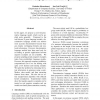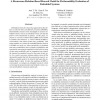1972 search results - page 12 / 395 » Hidden semi-Markov models |
PE
2010
Springer
13 years 5 months ago
2010
Springer
Solution of large sparse linear fixed-point problems lies at the heart of many important performance analysis calculations. These calculations include steady-state, transient and...
ACL
2007
13 years 8 months ago
2007
In this paper, we propose a novel discriminative language model, which can be applied quite generally. Compared to the well known N-gram language models, discriminative language m...
DSN
2008
IEEE
14 years 1 months ago
2008
IEEE
Embedded systems for closed-loop applications often behave as discrete-time semi-Markov processes (DTSMPs). Performability measures most meaningful to iterative embedded systems, ...
SFM
2007
Springer
14 years 1 months ago
2007
Springer
Stochastic performance models provide a powerful way of capturing and analysing the behaviour of complex concurrent systems. Traditionally, performance measures for these models ar...
ACL
2012
11 years 9 months ago
2012
This paper presents a novel sequence labeling model based on the latent-variable semiMarkov conditional random fields for jointly extracting argument roles of events from texts. ...


